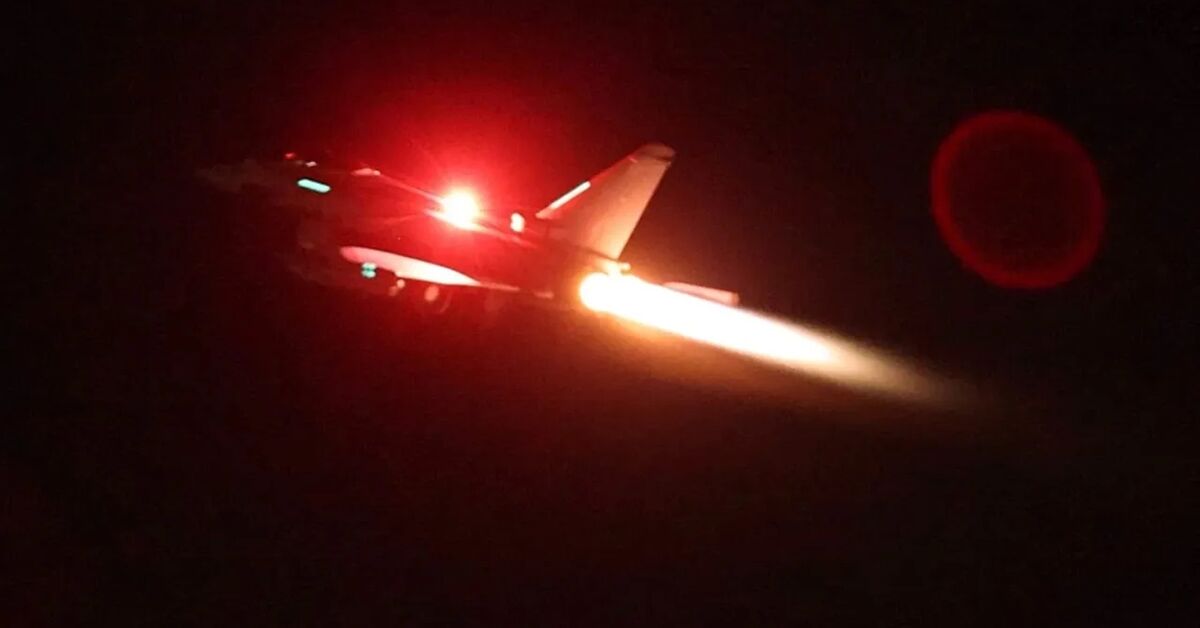From Turkey to Iran, condemnations, calls for revenge to strikes on Houthis
Tension in the Middle East took a new height on Friday, after the United States and Britain launched precision strikes from the air and sea against dozens of Houthi military targets in Yemen overnight in response to the repeated attacks against commercial vessels in the Red Sea.
Tensions were already at a peak as the Hamas-Israel war in the Gaza Strip spills over to other areas of the region, including Lebanon, Syria, Iraq and now Yemen.
Iran’s proxies in the region have launched repeated attacks against US troops and Israel since the war erupted Oct. 7 in a show of solidarity with the Palestinians in the Gaza Strip.
Houthis vow revenge
The Houthi group rushed to condemn the strikes, warning the United States and Britain of a major response.
In a statement carried by Yemen’s Houthi-run Saba News Agency on Friday, the group’s military spokesperson Yahya Saree said the US and British forces launched 73 strikes on the capital Sanaa and the governorates of Hodeidah, Taiz, Hajjah and Saada, killing at least five people and injuring six others.
He warned that the United States and United Kingdom bear full responsibility for their “criminal aggression” against Yemen, stressing that the attack “will not go unanswered and unpunished.”
“The Yemeni armed forces will not hesitate to target the sources of threat and all hostile targets at sea and on land to defend Yemen and its sovereignty,” he further threatened.
For his part, Houthi spokesperson Mohammed Abdul Salam called the strikes a “treacherous aggression.” In a post on X, he said that this action will not stop the Houthis from targeting Israeli vessels or ships heading to Israel.
Meanwhile, hundreds of people took to the streets in Saada in condemnation of the overnight strikes. Large crowds waving their weapons and holding pictures of Houthi leader Abdul-Malik al-Houthi shouted, “Death to America, Death to Israel.”
الشعب اليماني متوكل على الله ومتسلح بالإيمان والحكمة..
لايخشى الموت في سبيل الله لنصرة أطفال ونساء فلسطين..
حتى بعد تعرضهم للعدوان الآثم البارحة..مظاهرة في صعدة دعما لـ #غزة وتنديدا بالعدوان الصهيوني الأميركي🇺🇸 البريطاني🇬🇧 على اليمن 🇾🇪 ، وتعلن تأييدها للقيادة في دعم فلسطين 🇵🇸 pic.twitter.com/0BtUzUG9z2
— عبدالله بن حمد العذبة (@A_AlAthbah) January 12, 2024
Hezbollah, Hamas react
Iran and its proxies in the region also raised their voices to condemn the overnight strikes against Yemen.
Iran’s Foreign Ministry spokesperson Nasser Kanaani said in a statement Friday that the attack is “a clear violation of Yemen’s sovereignty and territorial integrity, and a breach of international laws,” warning that it will further fuel insecurity and instability in the region.
He called on the international community to take the necessary measures to prevent the spread of war.
In Beirut, the Iran-backed Hezbollah movement, which has been engaged in heavy fire exchanges with Israel along the Lebanese border, strongly condemned the “US and British blatant aggression against Yemen.”
The movement said in a statement that the attack shows that the United States is a full partner in Israel’s “massacres” in the Gaza Strip and the region.
More than 23,000 Palestinians have been killed since Israel waged its air and ground campaign against Gaza in retaliation for Hamas’ cross-border assault Oct. 7, during which militants killed around 1,200 people and took around 240 others hostage.
The Hamas movement also stepped up to condemn the US and British strikes against Yemen, hailing the Houthis for their support for the Palestinians.
“We in the Islamic Resistance Movement condemn in the strongest terms the American-British aggression, and the air and sea bombardment on Yemeni lands, and we consider it a crime and a blatant aggression against Yemeni sovereignty, and a threat to the security of the region,” Hamas said in a statement.
It went on, “Security and stability in the region can only be achieved when the Zionist occupation of our Palestinian and Arab lands comes to an end. This calls for Washington and London to review their colonialist policies, and to respect the sovereignty of Arab countries.”
In Iraq, Iranian-backed groups Asaib Ahl al-Haqq and Kataib Sayyid al-Shuhada condemned the strikes in separate statements as a flagrant violation of Yemen’s sovereignty and expressed their unwavering support for the Yemeni people and the Houthis.
The Islamic Resistance in Iraq, a loose alliance of Iran-linked armed groups that has claimed responsibility for a series of drone and missile strikes against US troops in Iraq and Syria in recent weeks, has yet to comment on Friday’s strikes.
But hours before the strikes on Yemen, the group had threatened to respond to any such attack “with everything in our power.”
Turkey, Jordan, Oman condemn
Turkey’s President Recep Tayyip Erdogan lashed out Friday at the strikes, describing them as “disproportionate force.”
“All of these actions are the use of disproportionate force. … Right now, they are trying to turn the Red Sea into a bloodbath,” Erdogan told reporters in Istanbul, adding that he was receiving information that Houthis were “successfully” responding to those attacks.
“Iran, in turn, is looking out to protect itself,” he added.
In turn, Jordan’s Foreign Minister Ayman Safadi expressed concerns over the latest developments in the Red Sea, warning of their repercussions on regional security.
In comments to the official Petra news agency, Safadi further blamed Israel and its offensive on the Gaza Strip for the escalating tensions in the region. He warned, “The international community is at a humanitarian, moral, legal and security crossroads. Either it shoulders its responsibilities and ends Israel’s arrogant aggression and protects civilians, or allows Israeli Prime Minister Benjamin Netanyahu and his extremist ministers to drag us to a regional war that threatens world peace.”
Oman also condemned what it described as a “military action by friendly countries” while Israel continues to pound the Gaza Strip “without accountability or punishment.”
“Oman has warned several times about the risk of the extension of the conflict in the region due to the ongoing Israeli aggression against the Palestinian territories,” it said in a statement carried by official media.
The sultanate has remained neutral in the nine-year civil war in neighboring Yemen, where the Saudi-backed government is fighting the Iranian linked Houthi rebels, and has played a mediator role between the conflicting parties in an effort to end the violence.
Saudi Arabia issued a statement calling for restraint to avoid escalation in the region, stopping short of condemning the strikes in Yemen.
“The Kingdom of Saudi Arabia is following with great concern the military operations taking place in the Red Sea region and the airstrikes on a number of sites in the Republic of Yemen,” a Foreign Ministry statement read.
Since 2015, Saudi Arabia has been leading a military coalition of Arab nations in Yemen in support of the internationally recognized government against the Houthi rebels. The war in Yemen has killed more than 150,000 people and created what the UN describes as one of the world’s worst humanitarian crises.
World reactions
Russia condemned the move, saying it “poses a direct threat to global peace and security.”
“A large-scale military escalation in the Red Sea region could strike out the positive trends that have emerged recently in the Yemeni settlement process as well as provoke a destabilization of the situation throughout the Middle East,” Russian Foreign Ministry spokesperson Maria Zakharova told reporters in Moscow on Friday.
Meanwhile, Russia’s permanent mission to the United Nations said it requested an urgent meeting of the UN Security Council to discuss the strikes on Friday.
China, for its part, expressed concern over the escalation in the Red Sea while urging calm. “We hope that the relevant parties can all play a constructive and responsible role in protecting the regional security and stability of the Red Sea, in line with the international community’s shared interests,” Chinese Foreign Ministry spokesperson Mao Ning told a press briefing on Friday.
Russia and China both abstained from voting on a Security Council resolution demanding that the Houthis end their attacks in the Red Sea. The resolution was adopted on Wednesday with 11 votes.
Support for strikes
On the other end of the spectrum, the strikes against Houthi sites in Yemen were welcomed by 10 other countries.
Australia, Bahrain, Canada, Denmark, Germany, the Netherlands, New Zealand, South Korea, the United Kingdom and the United States issued a joint statement Friday, saying the action aimed to prevent further attacks in the Red Sea. Bahrain is the only Arab country that publicly supported the strikes.
It read, “Our aim remains to de-escalate tensions and restore stability in the Red Sea, but let our message be clear: We will not hesitate to defend lives and protect the free flow of commerce in one of the world’s most critical waterways in the face of continued threats.”
Separately, France has reiterated its condemnation of the Houthis’ repeated attacks on commercial traffic in the Red Sea.
“Through these armed actions, the Houthis bear a very heavy responsibility for regional escalation,” the French Foreign Ministry said in a statement, vowing to continue “shouldering its responsibilities and contributing to maritime security in the area in conjunction with its partners.”
EU naval mission?
The European Union is mulling establishing its own naval mission to patrol the Red Sea to protect international maritime traffic.
EU diplomats told Agence France-Presse on Friday that the plan, which has been in the works for weeks, will be discussed by the bloc next week.
Germany has already expressed its readiness to join the EU-led mission. Spain, however, said it would not take part. Spanish Defense Minister Margarita Robles told reporters in Madrid on Friday that her country will not be joining an EU-led Red Sea naval mission since it is already engaged in 17 other missions.



